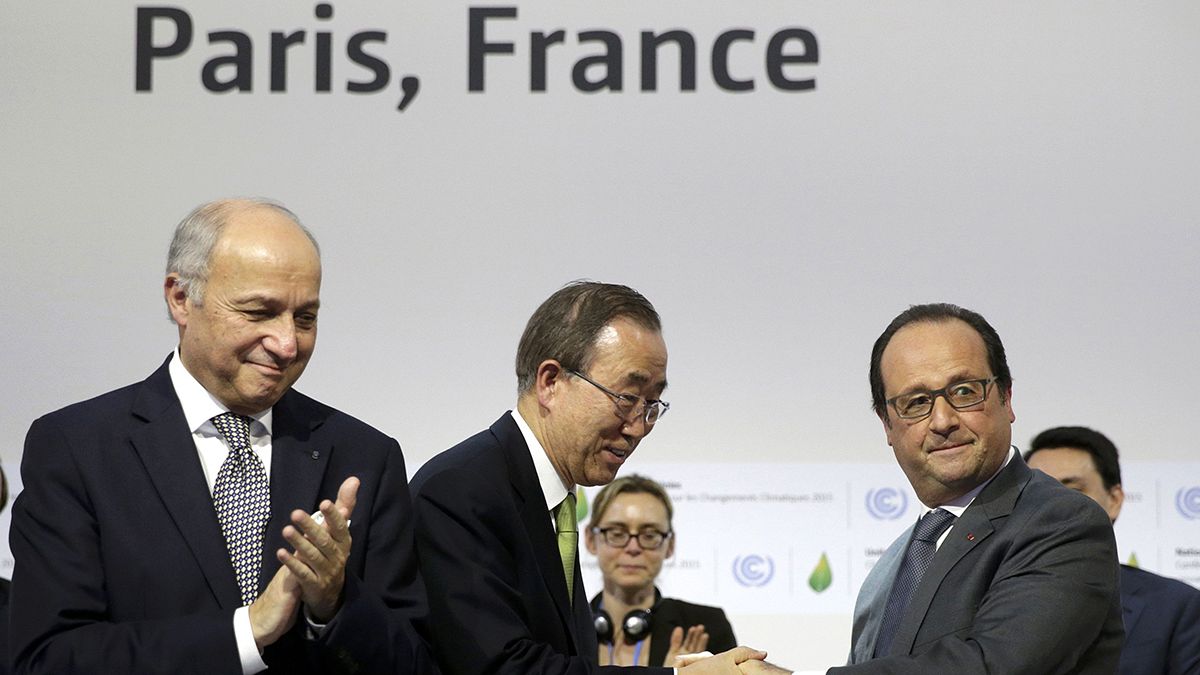The COP21 climate deal is not prefect but could be effective say experts if it is not watered down by big business lobbyists like the fossil fuel industy's
The details of the Paris accord are now being scrutinised by climate experts. Joining euronews for his take on the outcome is Professor David Mond, of Warwick University in England.
Nial O’Reilly, euronews:
“There’s been euphoria after the agreement, but is this the deal we should have got or the only one we could get under the circumstances?”
Dr. David Mond:
“Well, I think this is a whole lot better that the deals we got at previous meetings, better than any we got before so in that sense it’s a tremendous step forward. I think that a huge amount of the importance of this deal will be psychological and that effect plays a big impact on business.
For example, on the fossil fuel business and on the renewables business, and I think if one prospers and the other withers, as I think we all hope, then that will be a very important contribution. Whether this is the best deal, that’s, well, very hard to say.
In some respects it’s not as good as we could have hoped but we have the problem that any deal has to get through the US Congress, and a deal which fails to get through there and from which the US can walk away would be no achievement at all. So, if there’s a chance that this gets through then I’m pretty pleased.”
euronews:
“To what extent could the deal be undermined by, say, the powerful fossil fuel lobby? Do you think they will try to undermine it?”
David Mond:
“I think they undoubtedly will try to, they have to to survive. Like any creature that wants to survive they’ll do everything they can. I think that far from being the end of the period in which we have to be alert and active to force governments to make the changes needed, now it’s really the beginning.
Now governments have made an undertaking and now it’s up to the public sphere to make them keep to their word and to make sure that the fossil fuel lobby doesn’t win out.
I mean, just to look at the subsidies that fossil fuels are still getting , it’s in the region of 1 trillion dollars a year, both in tax breaks for fossil fuel companies and in subsidies to fossil fuel users to keep prices down.
If you add to that approximately 5 trillion dollars a year in subsidies you start to see as subsidies if you recognise that the damage to the world done by fossil fuels amounts to that much, then the fossil fuel industry is receiving enormous subsidies and is enormously powerful , but is also enormously vulnerable to the removal of those subsides.
So if governments act to limit those subsidies and to start demanding from the fossil fuel companies that they be responsible for the damage that they’re causing, as for example what has happened to some extent with tobacco, then maybe things could really change.”
euronews:
“Governments issue the subsidies, but the problem is the national target commitments aren’t legally binding. How effective will this 5-yearly revision mechanism be?”
David Mond:
“I think that’s very much a question for organisations to make sure that it is effective.
It’s not at all obvious from the outset how effective it will be. It’s not at all obvious from the outset what it means that parts of the treaty are binding.
I’ve been trying to find in the commentary on the treaty what the nature of the binding agreement is, and who will hold the parties to their commitments, but that really hasn’t been made clear at all, besides which we have to take into account that it only becomes binding if 55 countries representing 55% of emissons ratify it, and that’s still a big question mark.”
euronews: “So, a lot of questions still to be answered. Professor Mond, thank you very much for your analysis.”
David Mond: “Thank you”
http://www.lemonde.fr/cop21/
G1. temperature 2100
Limit rise well below 2ºC
try to keep rise to 1.51C
G2. Emission goals 2050
Stop increases in greenhouse gases as soon as possible
From 2050: cut emission to level which absorbed.
G3 Revision mechanism every 5 years
1st performance assessment in 2025
Each news assessment must improve previous one.
G4 Financing 2020-2025
Rich countries to give $100bn a year from 2020
New higher goal to be set in 2025
